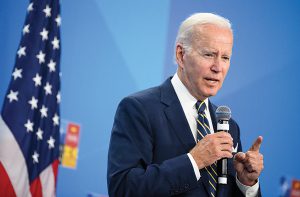Bloomberg
Taiwan has been left “hurt†and confused by contradictory signals coming out of Washington over a possible visit to Taipei by House Speaker Nancy Pelosi.
Pelosi is planning a trip to Asia that would include a visit to Taiwan, according to people familiar with the matter. It would be the first by a House speaker to Taipei since 1997. President Joe Biden however raised doubts about whether the visit would go ahead, saying Wednesday that the military thinks it’s “not a good idea right now.â€
“From Taiwan’s point of view, Biden’s comments don’t make us feel good. We feel hurt,†said Johnny Chiang, an opposition KMT lawmaker who co-chairs the legislature’s Foreign Affairs and National Defense Committee. “Because his comments imply that, first of all, there is a real military danger, and, second, the relationship between Taiwan and US are subject to Beijing, as if US-Taiwan ties are conditional.â€
China had warned Pelosi against making the trip, vowing to take a “resolute and strong†response if she landed in Taipei. Beijing routinely responds angrily to countries that deal directly with Taiwan, which China claims as part of its territory.
“I’m actually kind of surprised,†said Drew Thompson, visiting senior research fellow at the Lee Kuan Yew School of Public Policy at the National University of Singapore and a former US defense official. “Normally, the Pentagon is all about deterrence and taking non-military steps to demonstrate resolve and demonstrate support to bolster cross-strait stability. It seems kind of out of character for the Department of Defense to be afraid of friction when it’s part and parcel of the bilateral relationship.â€
Pelosi sidestepped questions about the trip at a press briefing Thursday, citing security concerns. “Maybe the military was afraid our plane would get shot down or something like that by the Chinese,†she said, without providing any details.
“We have to be mindful that the People’s Republic of China has a tendency of overreactions and they hope to use such overreactions as a way to deter countries from engaging in meaningful dialogue with Taiwan,†said Vincent Chao, former political director at the Taipei Economic and Cultural Representative Office in Washington, Taiwan’s de facto embassy. “So I think these are certainly factors that politicians both here in Taiwan and in the US should continue to keep in mind.â€
This isn’t the first time Biden has made comments that have left observers on both sides of the Pacific scrambling to interpret his intentions. During a trip to Tokyo in May, the president vowed the US would act “militarily†to defend Taiwan in the event of a Chinese attack.
The certitude of Biden’s remarks seemingly upended Washington’s decades-old approach of “strategic ambiguity†about whether the US military would defend Taiwan against Communist forces, while also adopting a “One China†policy which deems the question of sovereignty over Taiwan as undetermined.
Biden’s latest comments have left Taipei wondering whether China’s threats are proving effective in determining the US government’s actions.
“We don’t know whether Biden made those comments intentionally or just a slip of tongue,†the KMT’s Chiang said. “I think he does have such concerns on his mind, it’s just that, from Taiwan’s point of view, we think that’s not something that needed to be pointed out publicly.â€
 The Gulf Time Newspaper One of the finest business newspapers in the UAE brought to you by our professional writers and editors.
The Gulf Time Newspaper One of the finest business newspapers in the UAE brought to you by our professional writers and editors.
